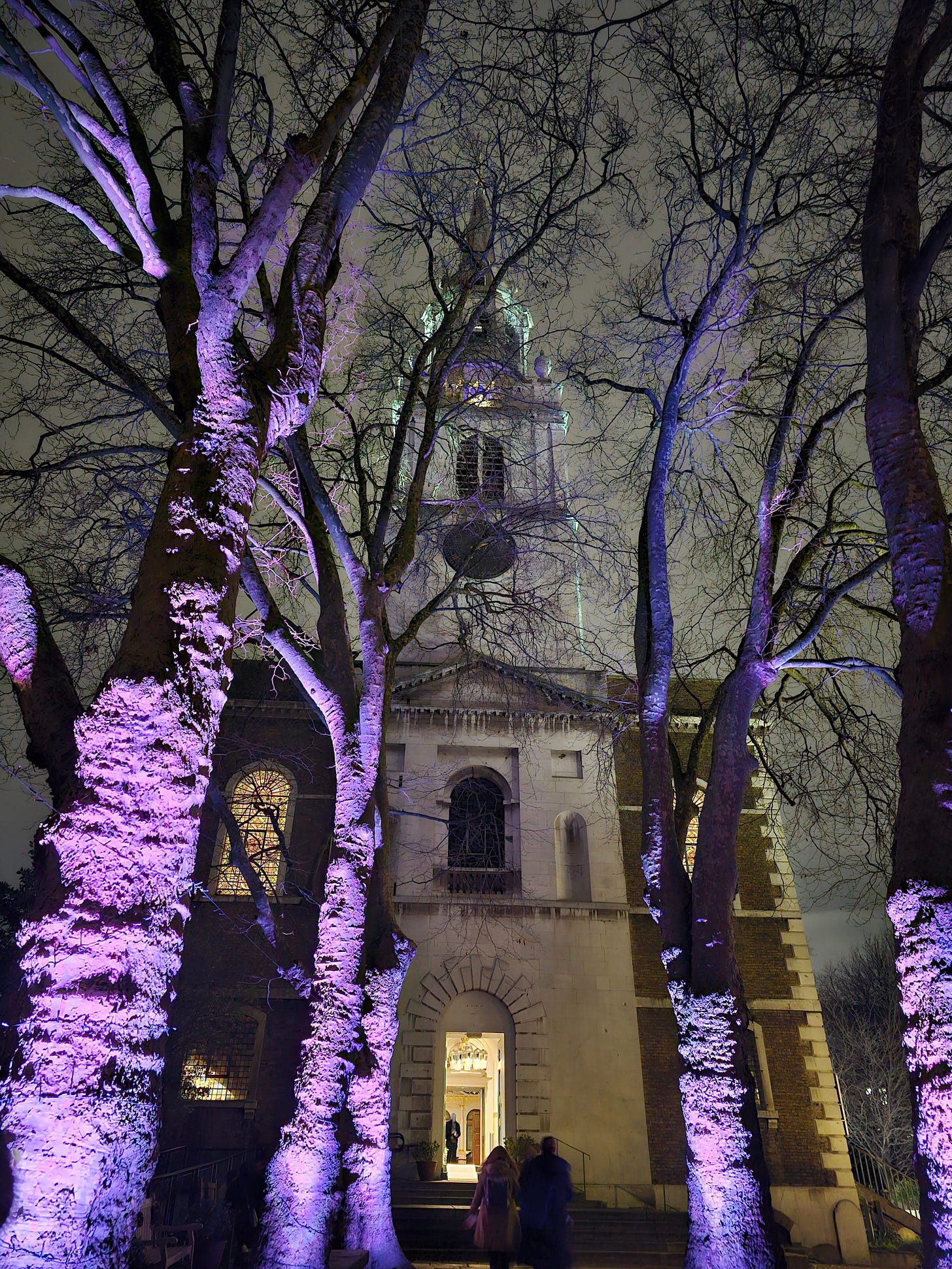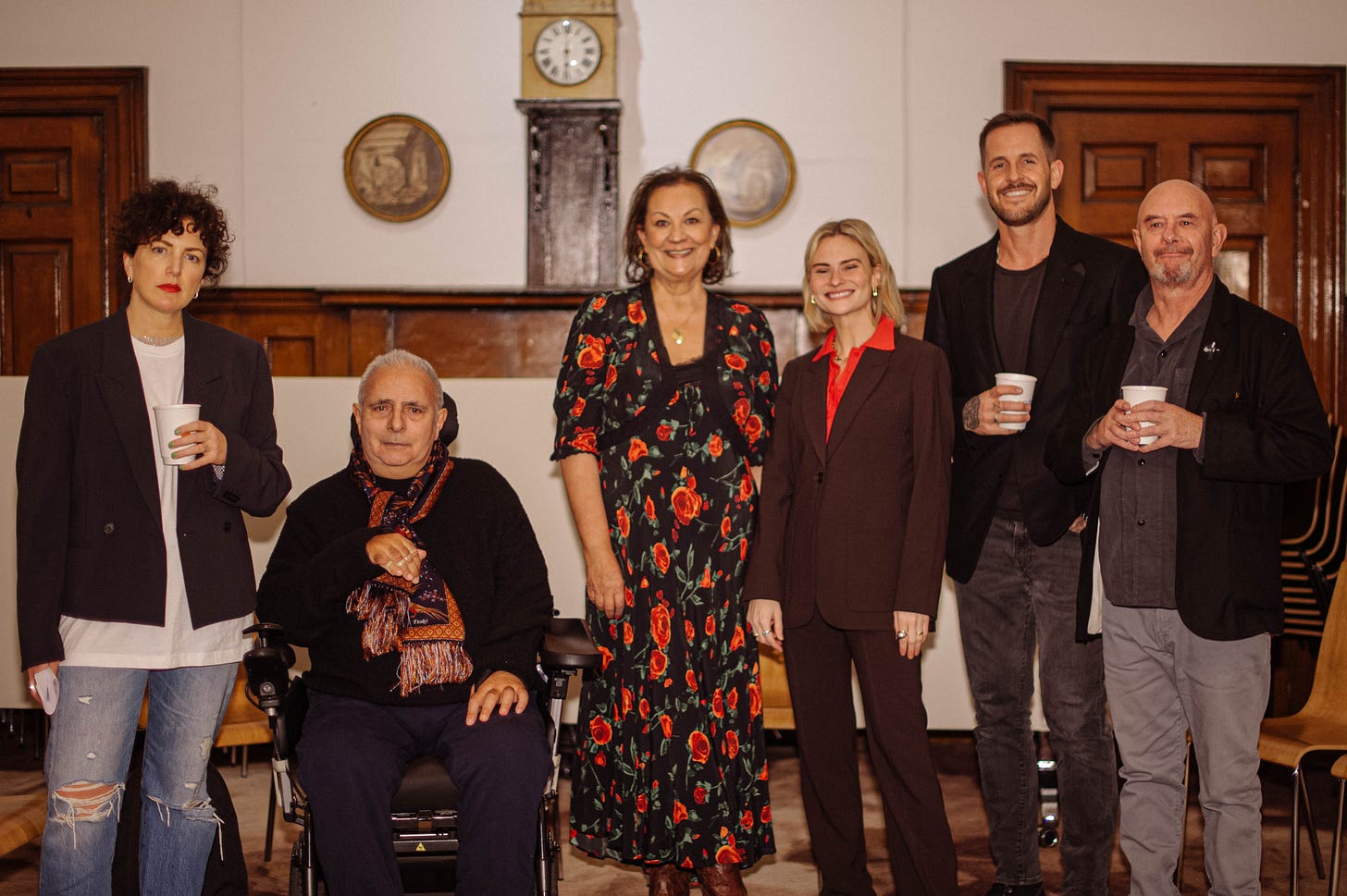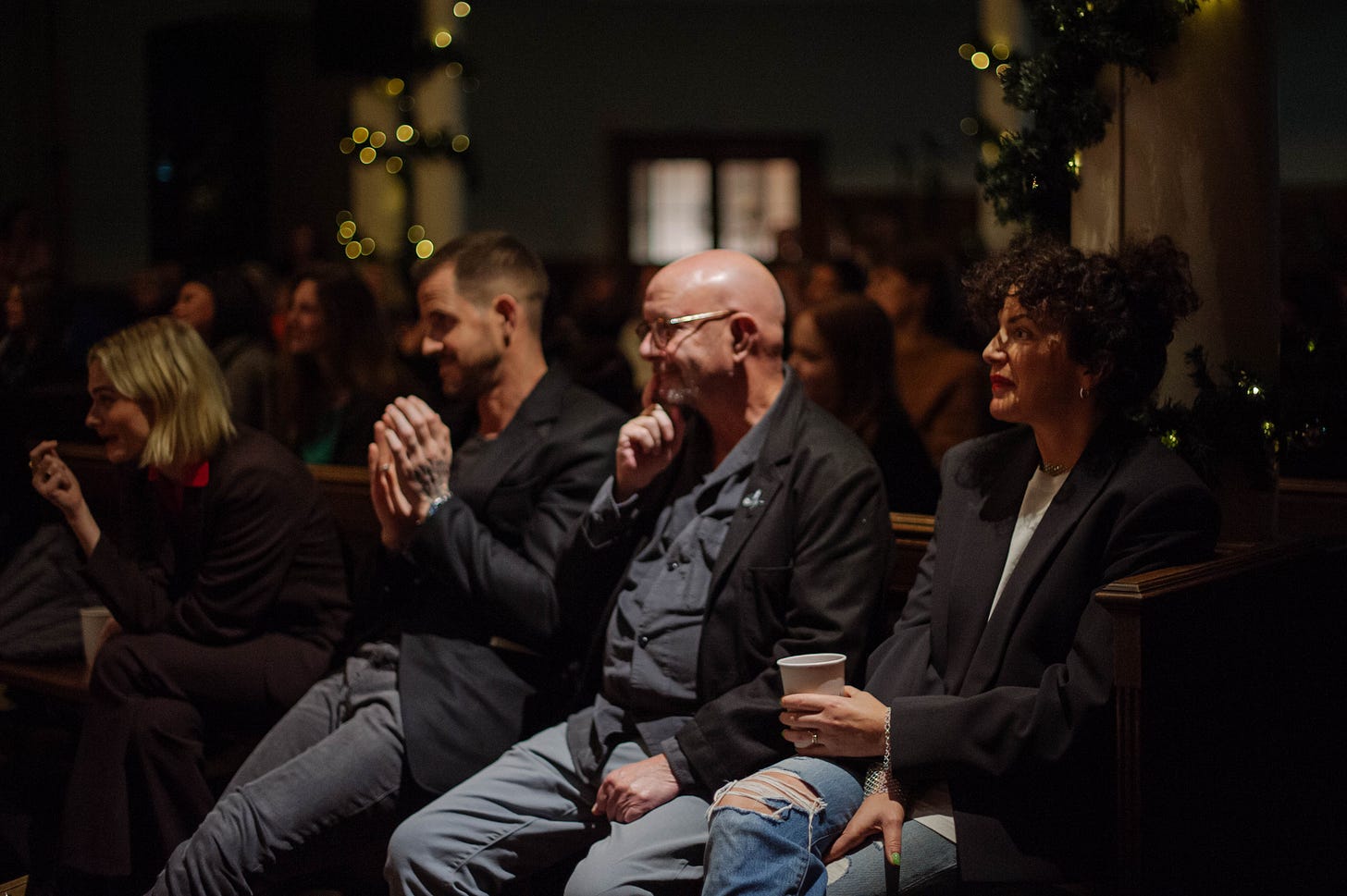On Monday night I went to the beautiful Church Of Saint James in Clerkenwell in London and met with the writers Nick Hornby, Pandora Sykes, Hanif Kureshi, Dan Jones, India Knight and Jameela Jamil to read in front of a crowd of our combined Substack subscribers. Farrah Storr, our Substack de facto leader and guide, asked us to write and read on the theme of togetherness. I’ve done plenty of literary events, but mostly they are around book promotion and involve a one on one situation with me being interviewed on stage in front of an audience. I also host my own events at the London Irish Centre, where I interview two authors at a time on stage, but I’ve never been part of an event like this, with six different writers and six different pieces of writing to hear. It made for a dynamic experience, with a huge breadth of topics. I still get so excited to be able to share the very solitary experience of writing with other writers, and It was especially nice, as a relative newcomer to Substack, to speak to Hanif Kureshi and his son Carlo about how they navigate being on here. I found the whole thing really inspiring and encouraging. I read a bespoke piece I wrote for the event on the theme of exceptionalism and togetherness. Some people asked for me to post it on here so voila! Substack kindly recorded my reading too so I’ve included this if you want to get a feel of the atmosphere in the room.
On Togetherness.
When you’re Irish you grow up with a deep understanding of Imperialism and the exceptionalist thinking that fuels it. At the heart of our history lessons in secondary school is the story of The Great Famine, a defining and horrific period of Irish history which happened in the mid nineteenth century when Ireland was ruled by England.
The main source of food in Ireland at the time was potatoes, and when there was a blight in the potato crop people began to starve. Half a million people were evicted from their houses, often illegally and violently. As more and more people died, the English government continued to export all other Irish crops out of the country, causing mass starvation. Altogether, over one million people died. A quarter of the population disappeared, either in death or in emigration.
This explains why Ireland as a country is generally deeply empathetic to the plight of Palestinian people. Because to Irish people, mass starvation is not an incomprehensible thing, less than 200 years ago it happened and it was as a direct result of English exceptionalism.
Exceptionalism is the enemy of togetherness. To be in harmony with other people involves the practise of acceptance, understanding and empathy. That’s hard to achieve when you believe that your existence matters more than other peoples. We’re all guilty of it, in much lesser ways of course, but it’s there in every judgement we make, in our friendship groups, our families, our class rooms, our work places… we like to think that we contribute to an equal society.. but we still pay to skip a queue when it suits us, we still want the best for our loved ones. Over half a million of our children go to private schools in the uk every year.
If Exceptionalism affects all of our interrelations as human beings, how does it affect our relationship with the earth?
It seems to me that as humans we have not just forgotten that we are part of nature, we have somehow, over the years, began to think that we’re better than it. Smarter than it. Exceptional to it. Just like the leaders of imperialism, we have drawn arbitrary lines in the sand of our planet and declared it and its animal species ours to own and ruin as we see fit.
The irony of course, is that all the answers to the question of how to achieve togetherness as a species lie in nature.
Look to the bottom of a tropical sea, to a school of iridescent pink and yellow fish sliding through the turquoise. They swim close to one another to confuse predators, and to conserve energy. They make perfect sense as a whole.
Look up to the sky at dusk and see a murmuration of starlings, wheeling in unison. There are no leaders, just a huge collective of tiny souls, swooping and diving as one, in complex patterns, without ever colliding. it is harder for birds of prey to target one bird in a hypnotising flock of thousands.
And then there’s trees. In the book The Hidden Life of Trees: What They Feel, How They Communicate - its author Peter Wohlleben describes how a tree can only as strong as the forest that surrounds it. How every tree is valuable to the community and worth keeping around for as long as possible and how even sick individual trees are supported and nourished until they recover;
How do trees support each other? Wohlleben says
“Neighboring trees help each other through their root systems — either directly, by intertwining their roots, or indirectly, by growing fungal networks around the roots that serve as a sort of extended nervous system connecting separate trees”
So In nature, togetherness is practised as a form of survival. There are examples of this in humanity too. I’m thinking of the NHS, and specifically, our system of blood donation. People willingly donate their own blood in order to help save the lives of others. This profoundly altruistic act is part of the system in which we live. It gives me hope.
But it’s getting harder and harder to feel a sense of togetherness in the modern world. There is a myth repeated that we don’t need anyone else. It is all about the individual. Contactless living makes us self sufficient! We can do a full days work, an exercise class, stream a movie, order dinner, speak to friends and climax all without leaving the house. Now we see the effects in the news. Nightclubs are closing. Pornography addiction is growing. Work from home culture is killing the Friday night out. Children’s anxiety is spreading like wildfire. Loneliness is becoming an epidemic.
I wrote an article for the Guardian last year about my experience of loneliness and one of the people I interviewed was the surgeon general of the United States, Vivek Murthy. He talked about loneliness as a public health crisis on the scale of the opoid epidemic or obesity. He said that our nervous systems, our hearts, our minds, are designed to need each other on an emotional level. If we don’t have physical human connection we become sick.
Note the physical there. Whatsapp doesn’t cut it. We need eye contact. We need touch. We need improvisation. We need to hear the tone of a voice in a room.
And to rid ourselves of any sense of exceptionalism that we may carry, be it conscious or unconscious, we need to wilfully spend time with people who are different than us, older, younger, richer, poorer, people who hold different opinions and ideologies. We have to listen to people. We have to be able to disagree with those people and still shake their hand, still wish them well.
We must stop believing that we can outsmart nature and start remembering that we are nature. Human beings do the same psychic dance that swallows do in a murmuration every day. Look at how we congregate, in queues, surging in and out of train carriages, pouring up and down stairwells, look at our interminable traffic jams.
We are essentially two legged creatures forming the same patterns of coming together and splitting apart every day. We all piss and shit and pick our noses. We are all floundering, frightened, lonely, overwhelmed.
All anyone wants is to feel like they belong. We can only ever do that, together. In the modern world, we have to fight for it. We have to gather, not inadvertently, but deliberately, intentionally, in kitchens, in community centres, in raves, in cafes, on the streets, in churches, in parks… because we are not special. We are part of something so much bigger than ourselves. Nature. We know from nature that togetherness is a form of survival. The conscious remembering of this is what will save us.















